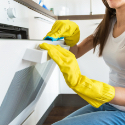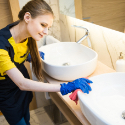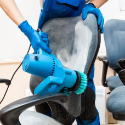Why start a cleaning business: Is it worth it?
According to the British Cleaning Council, in 2019 the UK cleaning industry employs over 700,000 people and contributes over £24 billion to the economy. If you’re looking to join those ranks, you’ll find there are quite a few benefits to owning your own business – especially a cleaning one.
Low start-up costs
One of the great benefits to starting a cleaning business is the low startup costs. Because you work at client premises, you won’t need a storefront and since you don’t sell a product, there aren’t upfront costs associated with accumulating stock. Ultimately all you need is the right cleaning products, a way to transport to them to different locations, and the right insurance to protect you.
More flexibility with time
When you’re your own boss, you don’t have to work the standard 9 to 5. You’ll have the chance to choose the hours that work best for you and not take on clients whose schedules don’t work with your needs. Having full control of your calendar can make it much easier to balance any other responsibilities you might have.
Choose your own jobs
If a job doesn’t interest you or it is too far away, you’ll have the right to turn down business that doesn’t suit you. Having that complete control means you’ll be able to focus on the jobs you want to do and pass on the ones you don’t. One of the big benefits of being your own boss is having the right to choose your own jobs and manage your workload as you see fit.
No experience required
There aren’t many requirements or qualifications required for becoming a cleaner, so there’s a pretty low barrier to entry. However, it’s worthwhile to educate yourself on the safe use of chemicals and to read the labels on all products before using them. Remember that combining cleaning chemicals incorrectly can have disastrous consequences, so while no experience is needed to become a cleaner you’ll definitely want to learn cleaning safety before getting started.
Create your own culture
If your business becomes bigger and you start to take on employees, you’ll be able to direct the company culture and shape it the way you want. You can develop ways of working that you think are best and implement them as the business grows.
What are the different types of cleaning companies?
Before you stick on your rubber gloves and get down to business, first things first. You’ve got to decide what kind of cleaning you’re going to specialise in.
Roughly speaking, there’s three main types:
Residential cleaning
You’ll be the type of cleaner who goes into people’s homes – cleaning carpets, kitchens and bathrooms. Polishing taps, mopping floors and dusting your client’s most precious knick-knacks, your job will require a real eye for detail and respect for the beloved things of others.
Commercial cleaning
You’ll be the type of cleaner that goes into other businesses – working in offices, shops and studio spaces. Wiping down desks, clearing canteen areas and tidying office blocks, you’ll cover a lot of ground on your shift – so, you’ll need to enter with a plan of action.
Specialised cleaning
You’ll provide a special type of cleaning service which requires real expertise in a specific area or field. It could be cleaning graffiti, chemical spills or other. Specialist cleaners will likely require additional training, accreditations, health and safety considerations and even specialised, bespoke small business insurance.
How much do cleaners get paid?
UK Indeed reports that the average cleaner makes £10.31 per hour or roughly £19,000 per year. However, many of those cleaners could be employed to work in other people’s businesses. Check A Trade estimated that a cleaner who is a sole trader would earn closet to £35,000 a year.
Of course, your earning potential can also be affected by other factors such as your cleaning niche (residential, commercial, or other specialisation) and your level of qualifications or experience, so this should only be taken as a general benchmark.
Step-By-Step Guide: How to start a cleaning business?
As stated earlier, many competitors have been using a step-by-step format with their ‘how to start a cleaning business’ guide. This helps provide users with an easy-to-read format.
-
Identify your market and choose your type of cleaning business
Doing your research is always the most important step when starting a business. Find out what other cleaning companies are in your area and see if there’s a type that’s missing. This will help you narrow down a market and choose your type of cleaning business. For example, if there’s a lot of residential cleaners in your area, but there’s no commercial ones and you have a business district near you, then there’s a gap in the market that you can fill.
-
Check your qualifications (Dependent on type of cleaning)
Think carefully about the work that you’re going to do. Particularly if you’re engaging in the types of specialist cleaning mentioned earlier, you may need additional equipment or cleaning supplies which could require training or a license. If, for example, window cleaning is part of your product offering, then you’ll need to secure one – especially if you work in Scotland.
Most Scottish councils require window cleaners to have a licence. If you’re based in England or Wales, you’ll need to register as a waste carrier, broker or dealer. Working without a licence comes with the risk of a £2500 fine.

For more information about the types of business licences your cleaning company may need, visit AXA’s guide: Which business licenses do I need?
Read the guide -
Choose a name and setup a business license for your cleaning business
What’s in a name? When you’re setting out in business, you’ll need to come up with a catchy moniker. But it’s important to check that you’re not using a business name that’s already been taken.
How do you find out if your chosen business name has already been nabbed? If you’re thinking of establishing a limited company, there’s a handy search tool on Companies House where you can check if the name your company is using has already been taken. To get started, click here.
If you’re a sole trader, it can be a little bit trickier to guarantee that your name is unique. There’s no official register of sole trader names in the UK, and when you register as a sole trader with the HMRC you do so with your own name. However, you could choose a ‘trading name’, so John Smith could become ‘John Smith trading as Sunshine Cleaning Company’, although you’ll still need to register this name as a trademark to stop others trading under the same name as you.
-
Buy necessary cleaning equipment for your business
According to Check a trade, a self-employer cleaner will spend close to £5,000 a year on business expenses including their vehicle and fuel expenses, insurance, cleaning tools, marketing, and supplies.
In your first year you might find that you need more money to get basic tools or to test out different cleaning products, so leave yourself a healthy budget.
The supplies you need can vary depending on what type of cleaning business you’ve started, but some basics you might want include: disinfectant, bleach, multipurpose cleaner, floor cleaner, bleach, sponges, buckets, mops, protective gloves, mildew cleaner and more.
-
Decide how much to charge for your cleaning services
You’ll need to work out how to price yourself and pitch your cleaning business. And if you want to make an impact, it’s important to stand out from the pack.
Take a good look at your competition and think about the gaps in your local market. What can you do that other companies can’t? Could you provide a service or offering that others don’t? What do your future customers need or want from a cleaning company that currently isn’t being provided? Do they want more green products, flexible working hours or tailored services?
What are your local competitors charging for their services? Price yourself accordingly, so you can stay competitive in the market and consider how you’ll accept payments too. Will you take advance payments, deposits or something a bit more flexible? Consult with your potential customers and clients to find out what works best for them to ensure you’re putting them at the heart of your plans from the outset.
Incentives or discounts could also help you generate a bit of interest in your business and attract new customers, for example offering the first cleaning session for free, or a small discount if a client recommends your services to a friend.
-
Write a business plan/marketing plan
To get ahead in life and business, you’ll need to plan. In the case of starting a cleaning company, that’s your business strategy and your marketing plan.
But if you’re confused about where to begin, don’t worry. AXA’s guides to writing a business plan or marketing plan could help you kick off on the right foot.
-
Look for cleaning contracts & clients
Once you’ve got all the business and marketing aspects sorted out, it’s time to start taking on clients. Where possible, try to get business agreed to in writing as that can help protect both you and your client. Be prepared to show proof of insurance as well, since some clients may require you to have that before they’ll enter into a business agreement with you.
Remember to be realistic in how many clients you can take on in a given week and that you need to ensure you can get between client premises in a reasonable amount of time. Coordinating so that you don’t have long travel distances between clients will probably be one of your most challenging logistics to manage, so keep this in mind when taking on contracts.
-
Hire & train cleaners to grow your business
If you get to a point where you have more clients than you can manage on your own, then it may be time to take on staff! Remember that you can always ease into having employees – taking on an apprentice or someone in a part-time role can be great ways to get an extra set of hands helping with the business. Just remember that if you employ anyone, it is legally required that you have employers’ liability insurance.
How much does it cost to start a cleaning business?
When you’re just starting out in business you might not have the biggest budget. So think intelligently about the amount of equipment you might need on day one, week one, and month one.
Your startup costs can vary significantly depending on the type of cleaning business that you start. A domestic cleaning service may only require small investment in a few essential items such as mops and cleaning cloths. In some cases, a client may even provide you with some cleaning tools in their home.
There’s the essentials like vacuums, mops, cloths and cleaning products that you’ll need – but have you considered specific signage that you’re legally required to have? Will your staff have full uniforms, or will an apron do?
Think about the minimum required to do a good job. Start small and build your business as you go. If you begin with the basics, you can always enhance your offer once you start to make a profit.
If you’re planning to become a commercial or a specialist cleaner, there may be higher costs associated with this as you’d likely need an equipment trolley, professional vacuum cleaner, other big equipment and a van to move it all about. And if you’re using a car or van to get around, you’ll probably need to consider van insurance too.
Should I start a self-employed or limited company cleaning business?
Deciding the kind of business you’ll be is incredibly important, because it affects everything from the wages you get to the tax you pay.
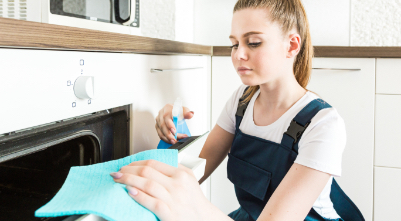
Sole-trader/self-employed
A person who’s the only owner of their business. There’s no legal separation between you as the business owner and the business itself.
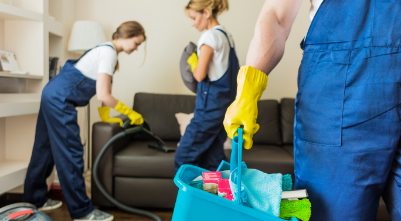
Limited company
A business which is a distinct legal entity from the business owner, formed whether you’re a one-person operation or have a few staff.
Get a deep dive into what this could mean for your business with AXA’s guide to different company structures: Sole trader or limited company?
Read the guideHow to get a cleaning contract and your first cleaning client
When you’re just starting out, it can be hard to figure out getting your first client. Often, you’ll need a multi-faceted approach to get the word out about your new business. Here’s a few ways you can try and reach prospective clients:
Utilise family and friends’ contacts
Talk to everyone about your new business – you never know who may be looking for a cleaner at that exact moment. If all of your family and friends know that you’re starting a business, they’ll be able to share that information with their networks too. If they hear of someone that needs a cleaner, they’ll be able to recommend your business.
Post on community groups
Look for local community groups or posting boards that you can promote your business on. Whether it’s the nextdoor app or a facebook group for your local area, there’s sure to be somewhere that you can drum up business near you.
Promote your services with business cards or flyers
Having flyers or business cards can be incredibly useful if you meet someone who may be interested in your cleaning services. Having a handout that they can take away and consider can be a very helpful marketing tool. You can also consider posting flyers on local notice boards or cafes that allow that.
Promote your cleaning service on social media
Creating a Facebook page and responding to comments, complaints and enquiries, and engaging online with your customers will significantly boost your real-life customer and client relationships.
Provide outstanding service so you get word of mouth recommendations
Businesses like yours often run on word-of-mouth recommendations and those are often generated when existing customers are happy. Once you’ve got business, make sure that you really nurture the relationships with those clients so that they’ll recommend you to others.
What types of insurance is there for cleaning businesses?
When you’re working so hard to build a business, you’ll want to keep it spick, span and squeaky clean. With AXA’s business insurance for cleaners, you can start with a clean slate and build the cover that fits your company’s needs – then build it as you grow your empire.
Public liability insurance
Protect your business in case someone is accidentally injured because of work you’ve carried out – like a slip or a fall on a squeaky-clean floor at the property you’re working at – with AXA's public liability insurance. It’ll help you stay covered against legal costs and protect yourself in case of any claims made against you.
Employers’ liability insurance
Protect your employees if they’re injured or become ill as a result of working for your business with employers’ liability insurance. If you have staff, you’re legally required to have it. It’ll cover damages, compensation costs and legal fees if an employee/ex-employee is successful in making a claim against you.

Not sure where to start?
Check out the AXA Business Insurance Wizard. Just answer four simple questions and you’ll get a list of the insurance your cleaning business might need.
Visit the business wizardReady to start a cleaning company?
Whatever type of cleaning business you decide to establish, you’ll have a lot of responsibilities. You’re busy organising cleaning schedules, acquiring new business and taking care of the daily paperwork, and that’s something worth protecting. Get started with AXA’s business insurance for cleaners.
